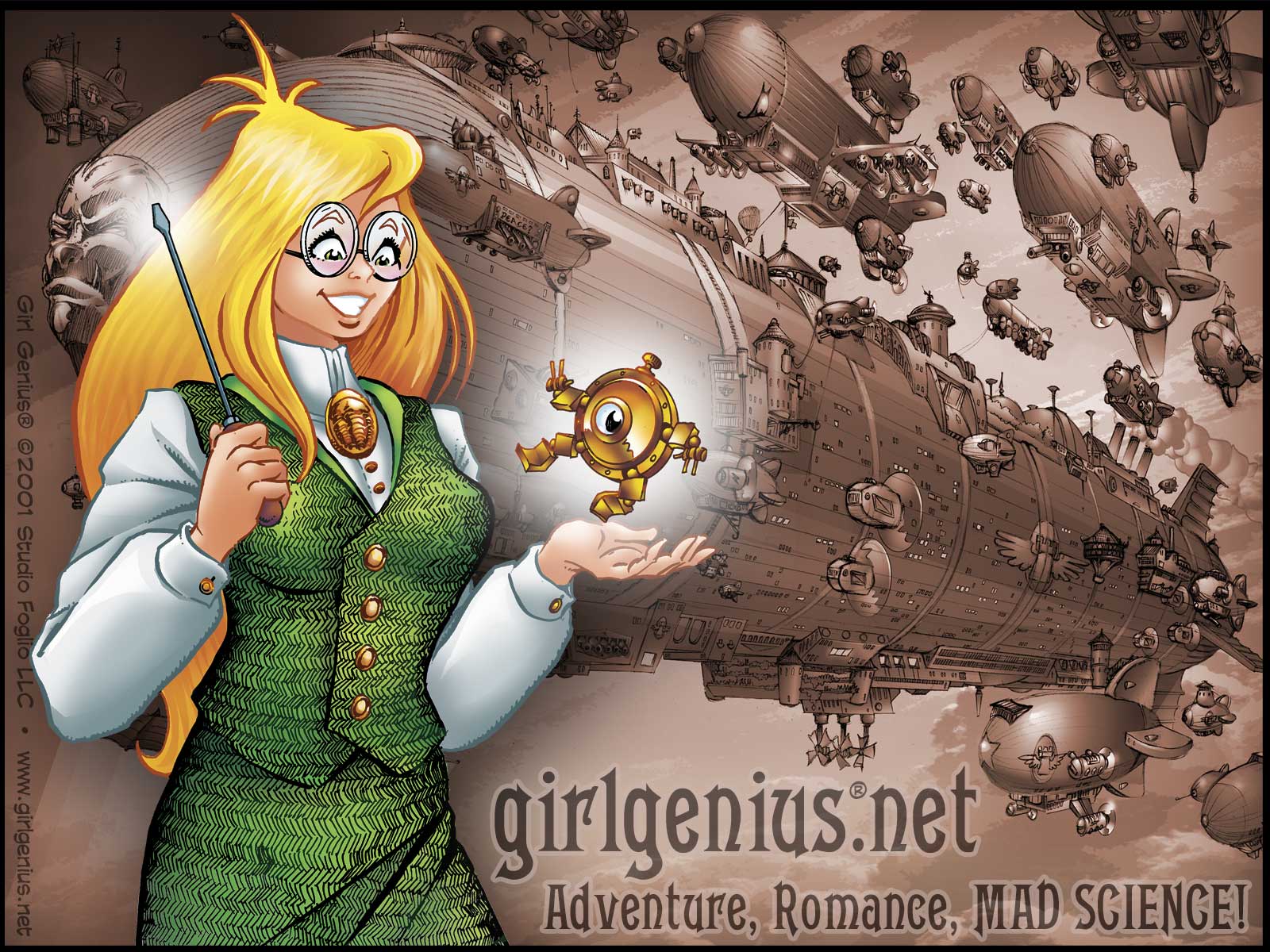Adventure! Romance! MAD SCIENCE!
Honestly, what more could you ask for to kill a lazy Sunday afternoon with?
D&D geeks of certain age will remember “What’s New,” a one-page comic by artist Phil Foglio that ran in the back of “Dragon” magazine. A few weeks ago I found myself laid up and aimlessly web surfing. By a strange segue of links that began at a site about nuclear space propulsion, I clicked my way to the discovery that Foglio is still churning out good stuff in the form of a web comic entitled “Girl Genius”. Having nothing better to do at the time, I began to read it out of nostalgia for my teenage geek years.
To my surprise, I found it really good. Far better than just drolly amusing.
I’m not a literary snob. Even in my middle years, I’ll read a good story in comic book form, but comic book stories that can really engage adults are few and far between. “Girl Genius” manages to do so by being very imaginative, not taking itself too seriously and by having near perfect literary technique.
“Girl Genius” is a “gas lamp scientifical fantasy”, set in an alternate Victorian era as decorated by Victor Frankenstein and populated by elite Mad Scientists who can produce technology far in advance of anything that ordinary people can gin up. We’re talking about giant, steam-powered automata terrorizing pitchfork-waving peasants while an evil scientist laughs cruelly up in his castle.
The story follows the adventures of Agatha, a pretty young student and laboratory assistant at Transylvania Polygnostic University (school motto: “Know Enough to be Afraid”). She soon discovers that…
And that’s all I can tell you without spoiling the story because the great genius of this work lies in the way that Foglio explains nothing. There isn’t an expository lump in the entire 300+ pages. There’s no dreaded, “As you know…” one sided expositions that never occur anywhere else in human conversation save in inept speculative fiction. He creates a story that makes the reader feel like a disembodied observer following the characters around and having to figure things out that the inhabitants of the world take for granted. He doesn’t explain the history of the world. He uses made up words without defining them. He refers to events that do not appear in the story. Foglio just kicks the reader into the flow of the story and expects them to swim by using their own imaginations and intellects to piece together the world from the hints that Foglio gives.
I find this style of storytelling very engaging and I wish more authors would use it. Foglio treats the reader with respect. He induces the reader to draw upon their own knowledge of classic horror movies, Jules Verne and Victoriana to flesh out what he leaves unsaid. Such fleshing out is not only entertaining in and off itself but also invites the reader to become a coauthor of the work. Foglio sketches out the story but the reader makes it well and truly bloom.
That to me is great art and I really don’t give a damn that the medium it happens to reside in is a comic.
This is not to say that Girl Genius will give you any great epiphanies. It’s just unserious, well-done fun. That alone makes it a jewel these days. Even better, you can read it for free but you can choose to support the author with donations or by purchasing hard copies or merchandise.
The story starts here. It begins in black&white and then transitions to color. Enjoy.

Ralph beat me to it!
:-)
Ralf Goergens,
There is a specific term for that: Steampunk.
I’m not sure if “Girl Genius” would qualify as steampunk. To qualify for the “punk” suffix, I think a story needs a certain gritty feel. After all, the entire idea behind the original cyberpunk was to look at how technology worked at the margins of society i.e. criminals and the underclass. “Girl Genius” doesn’t have any grit. It cast itself in the mold of stories from a much more innocent age.
There is a single expository lump spread over the two strips starting at this link: http://www.girlgeniusonline.com/comic.php?date=20080204. OTOH, it’s hard to tell what, if any, relevance that particular bit, “The Storm King Opera Synposis,” has to the plot, or even how much of it is true.
Of course, the reader is distracted from that by other details, such as that of the _original_ roller-skating giraffe and the origin of the lover’s duet.
Phil Fraering,
I don’t think the Storm King opera really qualifies as expository lump. Rather, it takes the form of a realistic act i.e. someone outlining a well known opera. Foglio doesn’t actually detail the opera but rather merely drops hints and invites the reader to fill in the details. A reader comes away with the feeling they know something about the piece but in reality they have constructed it.
I think the opera sequences is not expository but rather embeds small snippets of information that the reader will need later to fill in some later plot development.